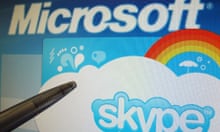Microsoft is reported to have closed a $8.5bn (£5bn) deal for the internet phone service Skype, in a deal that has shocked analysts who think it would be a substantial overpayment for the company.
The acquisition, which is expected to be announced on Tuesday, would be Microsoft's biggest, ahead the $6bn it paid for online advertising company aQuantive in 2007, and would bring it 660 million users worldwide while giving it a foothold in voice and video communications. Analysts suggested the service could be integrated into existing Microsoft products such as its Xbox 360 games console and Kinect gaming systems, or even into its flagship Office product to let users collaborate more effectively.
Speculation has been rife in Silicon Valley for months about Skype's future. Rumours last week suggested Facebook, Google or Cisco Systems were interested in acquiring it to fold into their own services. Tony Bates, the chief executive hired from Cisco last year, has reportedly been exploring the idea of joint ventures or a sale to Google and Facebook.
News of the deal and Microsoft's interest in Skype was first reported by the Wall Street Journal online and the technology site GigaOM.
Analysts have broadly favoured the idea of the deal, but questioned whether it could ever be worth the price. Skype was bought by eBay for $2.6bn in 2005: at the time people suggested its services could be incorporated into auctions so that bidders or sellers could call each other ahead of their close. But the synergistic ideas never materialised, and eBay wrote down Skype's value by $1.4bn, before selling off a 70% stake at the end of 2007. Ironically, the suggested price would make its 30% stake worth $2.4bn – effectively making money on the deal long-term.
Skype has debt of $686m, which Microsoft would assume in the purchase.
Microsoft's online efforts have been staggering loss-makers over the past few years. Its online service division, which includes its Bing search engine, has lost $8bn over the past six years, and has not been profitable since the end of 2005.
Google previously looked at purchasing Skype in 2005, but decided against it because of questions over patent ownership – essential patents for the service are owned by a company linked to Skype's founders – and doubts about integration into its own offerings.
Microsoft already has a voice-over-internet offering, called Lync, which combines email, instant messaging and voice communications into a single program. That is run by its huge Office division, one of Microsoft's two biggest profit centres along with the Windows division.
While Skype has a name among consumers, it has barely bumped along on profitability. With 663 million registered users, most of its services are free, using internet connections for make calls between computers or in some cases internet-enabled phones. It makes revenues on voicemail services and calls to physical landlines or mobile numbers.
In 2010 it recorded a loss of $7m on revenues of $859.8m, and there has been little sign that it will gain traction there.
Mobile carriers tend to see Skype as a threat to their own services, because it allows people to make calls for free via data links rather than over voice connections, and have been reluctant to route its traffic. Though Microsoft is keen to push its Windows Phone mobile operating system, it is not clear whether it could keep carriers sweet while incorporating that.
Microsoft rarely makes large purchases, preferring to buy smaller startups. It made an ill-fated $48bn bid for Yahoo in January 2008, which was opposed and fell apart. Since then Yahoo's value has halved and Microsoft has taken over its search business, but in their latest quarterly results the companies revealed that integration had been more difficult than they expected. In 2004 it also explored a takeover of the corporate integration software company SAP for $50bn, but that too stalled.




Comments (…)
Sign in or create your Guardian account to join the discussion